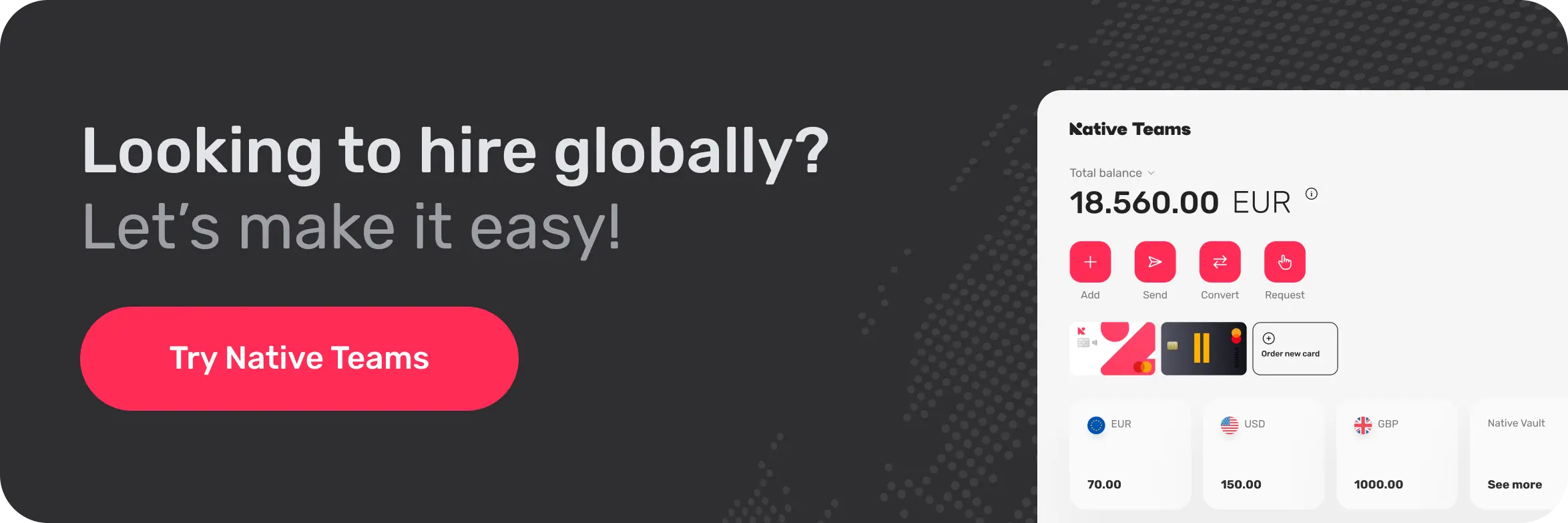
Employment
Legal employment for your global team
EOR (Employer of Record)
Your global team, locally employed
Entity Management
Set up and manage entities
HR, Payroll & Benefits
Manage all admin tasks from one place
Global Employee Benefits
Premium benefits for your global team
Relocation and Visa
Relocate your team anywhere
Employment Contracts
Localised employment contracts
Professional Employer Organization (PEO)
Struggling to manage HR, payroll, and compliance in-house? A Professional Employer Organization (PEO) could be the solution. But how does a PEO work, who should use one, and how is it different from an Employer of Record (EOR)?



Back to Glossary
What is a Professional Employer Organization (PEO)?
A Professional Employer Organization (PEO) is a service provider that helps businesses manage human resources, payroll, tax compliance, employee benefits, and other administrative functions through a co-employment arrangement. In this partnership, the PEO becomes the employer of record for tax and insurance purposes, while the client business retains control over day-to-day employee management and operational decisions. This model enables smaller companies to access the same level of HR services and employee benefits typically enjoyed by large corporations.
How does a PEO work?
When a business works with a PEO, both parties enter a contractual agreement where the PEO assumes responsibility for critical HR-related tasks. These include managing payroll, administering benefits, ensuring compliance with local employment laws, and mitigating workplace risks. The client company, on the other hand, maintains control over how employees are managed on a daily basis, including assigning tasks and overseeing performance. The co-employment model essentially splits responsibilities, allowing businesses to offload administrative burdens while remaining focused on growth and strategic development.
What are the benefits of using a PEO?
Working with Professional Employer Organization companies can provide a wide range of strategic advantages for businesses of all sizes.
Payroll & tax administration
PEOs handle all aspects of payroll processing, including salary calculations, tax withholdings, direct deposits, and tax reporting. This ensures accurate payments, timely filings, and compliance with evolving tax regulations.
Employee benefits
A key advantage of using a PEO is access to high-quality employee benefit plans at competitive rates. Through economies of scale, PEOs can negotiate better deals on health insurance, retirement plans, life insurance, and wellness programmes—making it easier for small businesses to attract and retain talent.
HR compliance & risk management
Labour laws and employment regulations are constantly changing, and non-compliance can result in costly penalties. PEOs stay up to date with all legal requirements and help businesses remain compliant with employment standards, health and safety guidelines, and workplace regulations. They may also assist with employee handbooks, contracts, and disciplinary procedures to reduce legal risks.
Talent acquisition
Some PEOs offer end-to-end recruitment support, including job posting, candidate screening, and onboarding. This helps businesses streamline their hiring process, reduce time-to-hire, and ensure compliance with local employment practices.
Scalability
As businesses grow or expand into new markets, the administrative load often increases. PEOs provide flexible HR infrastructure that can scale alongside the company, making it easier to hire in new regions, manage larger teams, and adapt to changing organisational needs.

Who should use a Professional Employer Organization?
A Professional Employer Organization can be a valuable partner for small to mid-sized companies that lack a large internal HR team but want to offer a professional employee experience. Startups scaling quickly, companies expanding into new geographic regions, or organizations facing complex compliance challenges may all benefit from PEO support. By outsourcing HR administration, these businesses can free up resources, mitigate risk, and focus on growth without being slowed down by operational tasks.
How much does a PEO cost?
The cost of using a Professional Employer Organization varies depending on the size of the business, the services selected, and the benefits provided to employees. Pricing typically follows one of two models: a percentage of the company’s total payroll or a flat monthly fee per employee. While initial costs might seem high, the return on investment often includes reduced legal risks, better employee retention, and significant time savings for internal teams.
What's the difference between EOR and PEO?
Although both PEOs and EORs (Employers of Record) help manage HR functions, they serve different purposes. A PEO operates under a co-employment model, meaning the client company remains the legal employer for day-to-day work, while the PEO manages back-office HR services. In contrast, an EOR becomes the official legal employer and is fully responsible for hiring, onboarding, and managing employees on behalf of a company, often in international markets. This distinction makes EORs ideal for global hiring without entity setup, while PEOs are better suited for domestic HR support with shared responsibilities.
Does Native Teams provide PEO services?
Yes, Native Teams provides Professional Employer Organization services to support businesses in managing HR, payroll, and compliance more effectively. Our platform enables companies to simplify employment processes while offering high-quality benefits and maintaining compliance with local employment laws. Whether you're scaling locally or looking to streamline your operations, Native Teams has the tools and expertise to support your journey.
Key takeaways
- A Professional Employer Organization (PEO) is a co-employment partner that handles HR, payroll, benefits, compliance, and more.
- PEOs enable businesses—especially small and mid-sized ones—to offer enterprise-level HR services without building an in-house department.
- Through a co-employment model, the PEO becomes the employer of record for tax and compliance, while the client retains operational control.
- Benefits of using a PEO include payroll accuracy, better benefits packages, reduced compliance risk, and improved scalability.
- PEOs are ideal for domestic workforce support, while EORs are better suited for global hiring and legal employment without entity setup.